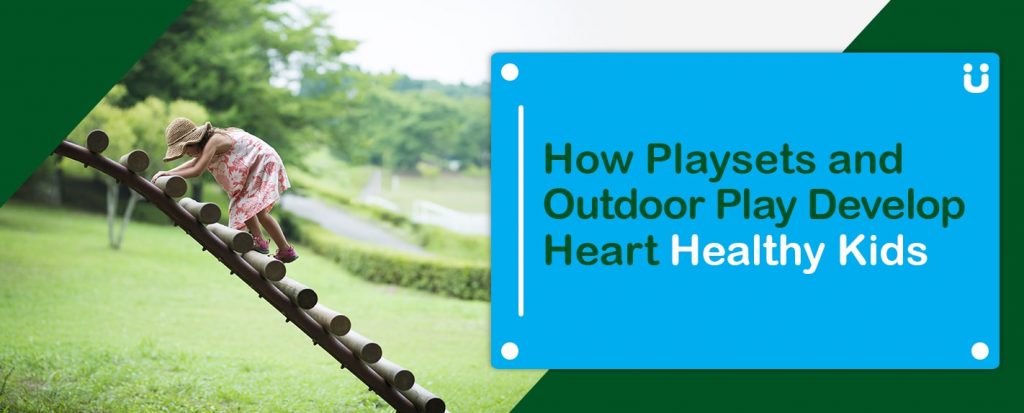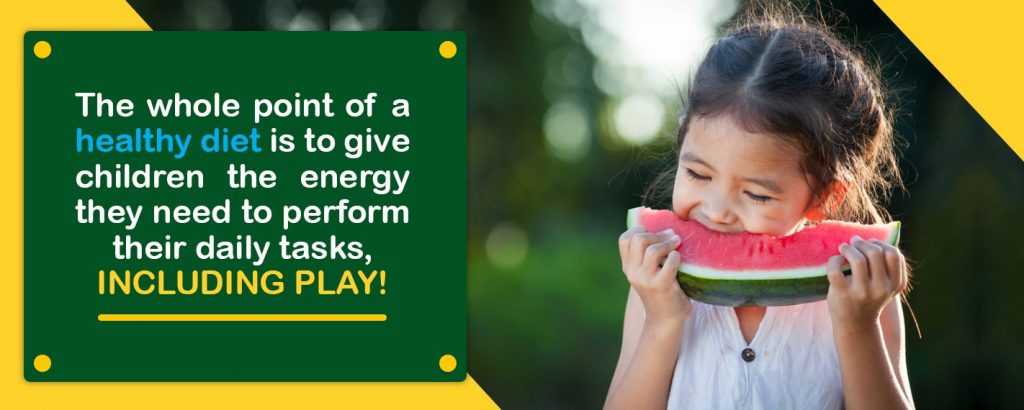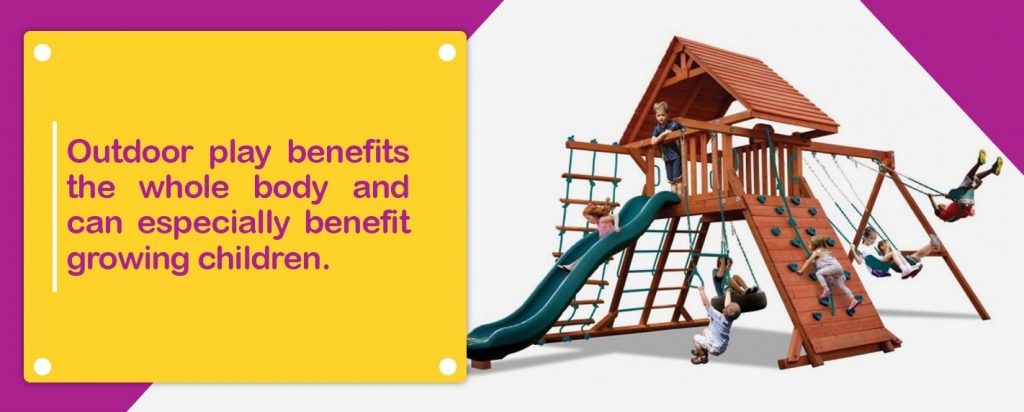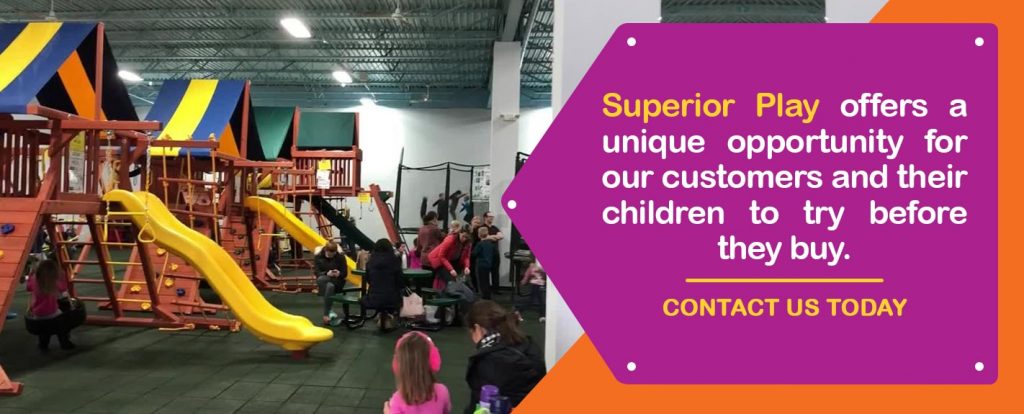How Playsets and Outdoor Play Develop Heart Healthy Kids

- Importance of Heart Health in Children
- Four Habits of Heart Healthy Kids (And Parents)
- The Benefits of Outdoor Play
- Ways Playsets Can Improve Health
- How to Keep Your Child’s Heart Healthy
Ahhh, playtime. Just the word conjures up memories of long summer evenings spent catching fireflies, playing kickball and riding bikes. While this is a common memory for parents everywhere, children today aren’t experiencing the benefits of outdoor play. Playtime is quickly getting pushed out by schoolwork, sports and screen time. Children are hardwired to learn through play, but today’s child isn’t getting the time they need to do that.
For children, the benefits of playing outside are significant. Outdoor play is essential for children’s heart health, as well as preventing illness and obesity. Children also miss out on the developmental benefits of play, which can help them learn how to behave in social situations and help them practice using their imagination and creativity. Besides the health benefits in childhood, the fitness and habits that children develop earlier in life will serve them well later, lowering their risks for certain diseases and giving them a greater appreciation for physical activities and the outdoors.
Importance of Heart Health in Children
Nearly one in five children between the ages of six to 19 are considered obese. This figure is more than three times greater than it was in the 1970s, which is alarming. While there are several factors that can contribute to childhood obesity, one of the biggest is a lack of physical activity. Children are spending too much time at their desks at school and in front of screens at home. They aren’t running and playing like the generation before them. Instead, they are leading a much more sedentary lifestyle.
Childhood obesity puts children at risk for several chronic health problems, including type 2 diabetes, sleep apnea and asthma. It also puts them at higher risk for obesity and heart problems as adults, and adults who are obese are at a higher risk for type 2 diabetes and certain cancers as well.
With sobering statistics such as these, it’s more important than ever for parents to be concerned about their children’s health habits. The patterns and practices that children are building now are going to become the foundation for the patterns and practices they follow as adults. Yes, it seems strange to think that running around on a playground could have an impact on your child’s overall health and well-being — but it’s true. And it’s more important than ever that parents start taking notice of the importance of play in their children’s health.
Four Habits of Heart Healthy Kids (And Parents)
What can a parent do to improve their child’s health and keep their heart healthy for years to come? It’s actually quite simple.
1. Encourage Outdoor Play
One of the healthiest things you can do for your child is to encourage them to run around outside. When you encourage your child to get moving, they are healthier. They burn calories, which keeps them from becoming obese and risking the variety of health issues we mentioned in the last section. If your child is playing on a playset — either at home or at a local playground — there are even more physical benefits because all the climbing, swinging, sliding and other motions they make on the equipment help to build strong muscles, including their heart.
If you start encouraging activity in them as children, they will be more likely to become active — and, therefore, healthier — adults. Aim for a minimum of one hour of active, outdoor play every day, but, of course, more is always better too! And, when weather prevents outdoor play, look for indoor alternatives, such as a local gym with a children’s program or indoor playgrounds, which can provide the physical benefits of heart-healthy outdoor activities without worrying about severe temperatures or precipitation.
2. Offer Healthy Food Choices
The whole point of a healthy diet is to give children the energy they need to perform their daily tasks, including play! By stocking your pantry full of healthy foods, you’re giving your children the fuel they need to make it through their day and stay healthy. The American Heart Association recommends a diet high in vegetables, fruit and whole grains. Dairy and protein should be consumed in moderation, but they are also important for good health.

It can be tempting to grab meals at the drive-through after soccer practice or on your way home from work, and the occasional treat isn’t going to destroy your child’s health. But, limit this to the occasional special treat to avoid the high amounts of fat and sugar that can be hidden in even the healthiest of takeout options.
3. Limit Screen Time
Children spend an average of seven hours in front of screens each day. Too much TV time, combined with phones, tablets and computers has resulted in kids spending too much time inside and not enough time playing outside. Yes, kids will say they’re “playing” video games, but this kind of play doesn’t have the same positive mental and physical effects of outdoor play. In fact, too much screen time in kids has been shown to delay cognitive development. Limit your children to about an hour max of screen time each day, and give them heart-healthy alternatives — like playing outside — to pass the time.
4. Don’t Smoke
All of the other health tips in the world won’t mean much if you or someone in your household is a smoker. One-third of deaths from coronary heart disease are attributed to smoking and exposure to secondhand smoke. If you already smoke, it’s time to quit. Your health — and the health of your child — depends on it. If your child is old enough that smoking may become a temptation for them, make sure to talk with them about the dangers of smoking and the importance of avoiding this habit as they grow.
The Benefits of Outdoor Play
There are many ways parents can teach their children healthy habits, but one of the best ways to keep your child’s heart healthy is by encouraging daily outdoor play. In the last section, we mentioned some of the heart health benefits of outdoor play, but the truth is that this habit extends far beyond the benefits of heart health. Outdoor play benefits the whole body and can especially benefit growing children.

Outdoor play provides a lot of physical benefits, but it is also developmentally beneficial to children as well. Children who spend regular time playing outside develop:
1. An Appreciation for Nature
Children who spend time outside learn to appreciate all that our planet has to offer. Children need unstructured time to dig in the dirt, turn over rocks, touch an earthworm and watch leaves falling from the trees. As they grow to appreciate nature, they will also learn the importance of taking care of all that is around us, and they’re more likely to enjoy the outdoors — and strive to be good stewards of the planet — when they’re adults.
2. Life Skills
When children play outside, especially if they play with other children, they are forced to use and grow the parts of their brain that are responsible for multi-tasking, troubleshooting, prioritizing and cooperation. In other words, spending unstructured playtime outside requires children to practice some of the most essential life skills they will need to master to be successful adults. During this time, children also use their imagination, practicing their creativity and developing their ability to entertain themselves and process through things they are learning in everyday life.
3. Socialization
This one can be tricky to understand. After all, children spend much of their time in school and sports with other children. Shouldn’t they already be able to socialize appropriately? While all of those structured activities do contribute to a child’s ability to interact appropriately with others, it’s simply not enough. Interacting in an unstructured, outdoor setting allows children to practice all the concepts they’re taught in those more structured environments, including working together, sharing and how to treat other people.
4. Healthy Bodies
When children spend time playing outside, they are improving their heart health. Running, climbing and jumping — and any movement they’re making as they play — is giving them exercise and building healthy muscles. But did you know that outside play has other health benefits, too? Regular outside play can improve bone structure, strengthen the immune system and decrease a child’s risk of anxiety and depression.
Ways Playsets Can Improve Health
Any amount of outdoor play will have positive benefits for children of any age. However, regular play on a playset — with swings, slides, things to climb and more — can provide some unique and targeted benefits for overall heart health. While the playground has been a staple of parental survival for years, many don’t realize that a trip to the park or an hour on a backyard jungle gym can actually benefit their children’s health and well-being. Here are some of those ways.

1. Regular Cardiovascular Activity
One of the best ways to combat childhood obesity is for children to engage in regular physical activity. This can be a challenge for some parents whose children may not enjoy playing outside or may have become accustomed to indoor activity. But it’s a challenge worth confronting because your child’s health depends on it.
A playset is a great way to inspire children to become more active because it doesn’t feel like exercise to them. While it still provides the benefits of exercise — strengthening muscles, increasing heart rate and improving flexibility — all children see when they look at a playset is fun.
How does a swing or set of monkey bars increase your child’s heart rate? Swinging requires children to use several different muscle groups to start moving and sustain the motion to go back and forth. Swinging across monkey bars provides a similar benefit. Anytime a child engages in an exercise that improves muscular and cardiovascular endurance, they are ultimately strengthening their heart.
2. Muscle Development
The development of motor skills — muscle movements needed to run, walk, jump, tie shoes, zip zippers and hold a pencil — happens in a specific order because a child’s body has to be physically strong enough to support each new movement and skill. Playsets have been proven to significantly improve a child’s motor skills by contributing to their muscle development. The more your child plays, the more they build their muscles, equipping their bodies to perform other essential daily functions, including continued activity.
In other words, if you want your child to keep moving and participating in activities that boost their heart health specifically, they also need to be spending time building their muscles by climbing ladders, swinging across the monkey bars and jumping across platforms on a playset.
3. Improved Coordination
As children move around a playset, they learn to navigate a series of challenges and obstacles that will test — and ultimately improve — their balance and coordination. For example, in a playset such as Superior Play’s Original Fort with Wood Roof, children climb up a rock wall to reach the fort. Climbing encourages children to practice their hand-eye coordination, improving their physical and mental ability to engage several muscle groups simultaneously.
Another example of how a playset can improve balance and coordination is found on the slide. A slide is designed to help children practice using their core to balance and stay upright when gravity is pulling them down. Monkey bars or a swing bar, such as the one found on Superior Play’s Original Playcenter Spacesaver 1 help children strengthen their arm muscles, as well as their grip — both important as they develop motor skills.
Improved coordination translates into everyday life since children are increasingly required to engage multiple muscle systems at the same time as they play sports, play an instrument or engage in chores around the house. In other words, children need coordination to be active — and active children are heart-healthy children.
4. Parent-Child Interaction
The benefits of free-play are important. Children need to spend time with other children, as well as on their own. But children also benefit from interacting with their parents during play. Spending time on a playset with your child will provide them with the security and enjoyment to branch out and try new things, including physical activity. It will build a healthy relationship with your child and promote a sense of well-being for them. Never underestimate the power of spending even just 30 minutes engaging with your child each day.
How to Keep Your Child’s Heart Healthy
There’s no doubt about it. Keeping your child healthy comes down to spending time outside and giving them opportunities to be physically active. What better way to do this than a playset from Superior Play? Our solid wood playsets are 100 percent chemical free. They hold up better than our competitors’ to give your child years of fun and exercise. With locations in New Jersey, Georgia, North Carolina and Pennsylvania, Superior Play offers a unique opportunity for our customers and their children to try before they buy.
Our showrooms double as indoor playgrounds for all ages — so you can play, too! Spending an afternoon swinging and sliding with your child will create memories and excitement for outdoor play that will make a lifelong impact on both of you. There’s no substitute for laughing with your child as you swing, slide or chase each other through a fort.
For more information about Superior Play playsets, or to try before you buy, get moving and contact us today!


